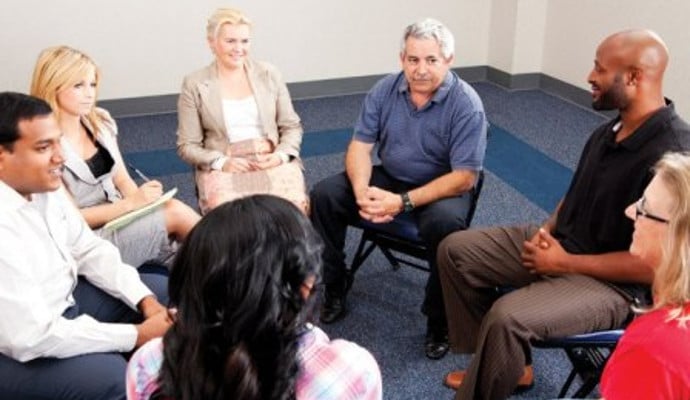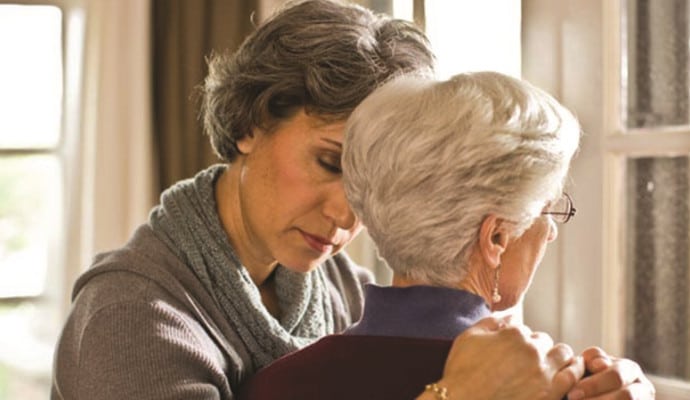
Caregiver support groups have significant positive effects
Any caregiver who’s felt stressed, confused, overwhelmed, depressed, or burned out would benefit from a caregiver support group. Studies have shown that support groups have a significant positive effect on caregivers’ well-being, depression, and feeling of burden.
Attending a caregiver support group is an effective way to reduce stress because you get a chance to vent to people who truly understand, get useful advice, and find out about helpful local resources.
But it might be intimidating to walk into a room full of strangers and talk about your caregiving situation. That’s why we’ve got an overview of why it’s worth your time, how a typical meeting works, and where to find a group in your area.
Why caregiver support groups are worth your time
- Learn valuable caregiving tips and resources from social workers or experienced caregivers.
- Get support and advice to help you make difficult decisions or deal with family conflicts.
- Give and receive advice on how to manage challenging behavior – you know, when your older adult drives you crazy.
- Find out how other caregivers make time to care for themselves.
- Laugh and cry with people who really get it. We all need an emotional release every now and then.
How caregiver support group meetings work
- Who leads the meeting? A facilitator, usually a social worker.
- How often do groups meet? Each group has a regular schedule – usually weekly or monthly on the same day, time, and location.
- What if I miss a meeting? No problem, you don’t have to go regularly. Just attend when you can or when you need extra support.
- Do I have to talk? No, it’s completely optional to share. If you’d prefer not to speak, that’s absolutely ok – just let the facilitator know.
- How long do they last? Meetings usually last about two hours, but don’t let that keep you from attending. Talk to the facilitator if you need to arrive late or leave early.
- What happens during a meeting? The facilitator usually asks each person to introduce themselves and talk about their caregiving situation. After that, anyone can ask questions, ask for advice about specific situations, or bring up topics for discussion.
How to find a local caregiver support group
- Local hospitals or community centers almost always have handouts with lists of local support groups, check there first.
- For support groups that are focused on specific conditions, check the websites for information about local meetings. Popular sites include:
- Alzheimer’s Association
- National Stroke Association
- National Parkinson Foundation
- American Cancer Society
- Enter your zip code in the Eldercare Locator to find the Area Agency on Aging for your city. Call them to ask about local support groups.
You might also like:
— Q & A: I Tried a Caregiver Support Group, But Didn’t Like It. Now What?
— 8 Benefits of Caregiver Support Groups
— Alzheimer’s Support Group on Facebook: Memory People
By DailyCaring Editorial Team
Image: Prince William County Virginia
About the Author

Connie is the founder of DailyCaring.com and was a hands-on caregiver for her grandmother for 20 years. (Grandma made it to 101 years old!) She knows how challenging, overwhelming, and all-consuming caring for an older adult can be. She also understands the importance of support, especially in the form of practical solutions, valuable resources, and self-care tips.














Then try another! I found a support group through the Alzheimer’s Association that is for spouses for early onset dementia. It was awkward the first few times, but now I look forward to the meetings and keep in contact with some participants outside the group. It is difficult when a participant loses their spouse, but even in that, we learn and grow. I think at first it was difficult to hear those who were farther along this journey, but as my journey gets more difficult I so appreciate their wisdom and acceptance. In our group we do a lot of laughing….when you are with others that walk in your shoes, you can look at life a little lighter. It is a good relief for all of us. Please don’t try to do this all alone…there are resources out there. The Alzheimer’s Association is a great place to start.
Hi Mary — I’m so glad you found a support group that you truly enjoy! Having that support and wisdom makes a huge difference. And being able to laugh with people who truly understand the humor in these tough situations is so meaningful. Best, Connie